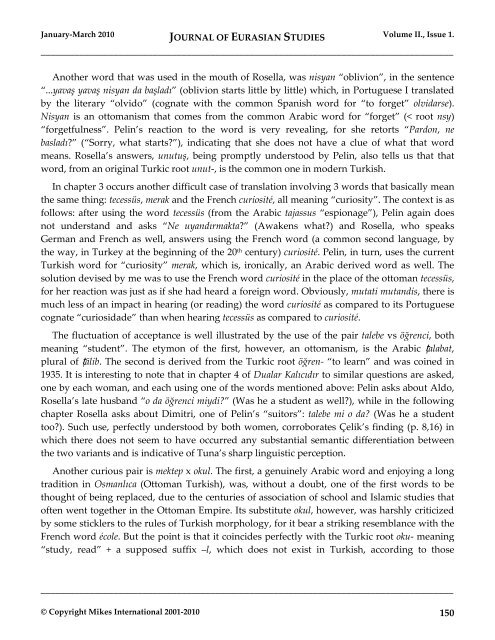EurasianStudies_0110..
EurasianStudies_0110..
EurasianStudies_0110..
You also want an ePaper? Increase the reach of your titles
YUMPU automatically turns print PDFs into web optimized ePapers that Google loves.
January-March 2010 JOURNAL OF EURASIAN STUDIES Volume II., Issue 1.<br />
_____________________________________________________________________________________<br />
Another word that was used in the mouth of Rosella, was nisyan “oblivion”, in the sentence<br />
“...yavaş yavaş nisyan da başladı” (oblivion starts little by little) which, in Portuguese I translated<br />
by the literary “olvido” (cognate with the common Spanish word for “to forget” olvidarse).<br />
Nisyan is an ottomanism that comes from the common Arabic word for “forget” (< root nsy)<br />
“forgetfulness”. Pelin’s reaction to the word is very revealing, for she retorts “Pardon, ne<br />
basladı?” (“Sorry, what starts?”), indicating that she does not have a clue of what that word<br />
means. Rosella’s answers, unutuş, being promptly understood by Pelin, also tells us that that<br />
word, from an original Turkic root unut-, is the common one in modern Turkish.<br />
In chapter 3 occurs another difficult case of translation involving 3 words that basically mean<br />
the same thing: tecessüs, merak and the French curiosité, all meaning “curiosity”. The context is as<br />
follows: after using the word tecessüs (from the Arabic tajassus “espionage”), Pelin again does<br />
not understand and asks “Ne uyandırmakta?” (Awakens what?) and Rosella, who speaks<br />
German and French as well, answers using the French word (a common second language, by<br />
the way, in Turkey at the beginning of the 20 th century) curiosité. Pelin, in turn, uses the current<br />
Turkish word for “curiosity” merak, which is, ironically, an Arabic derived word as well. The<br />
solution devised by me was to use the French word curiosité in the place of the ottoman tecessüs,<br />
for her reaction was just as if she had heard a foreign word. Obviously, mutati mutandis, there is<br />
much less of an impact in hearing (or reading) the word curiosité as compared to its Portuguese<br />
cognate “curiosidade” than when hearing tecessüs as compared to curiosité.<br />
The fluctuation of acceptance is well illustrated by the use of the pair talebe vs öğrenci, both<br />
meaning “student”. The etymon of the first, however, an ottomanism, is the Arabic ṭalabat,<br />
plural of ṭālib. The second is derived from the Turkic root öğren- “to learn” and was coined in<br />
1935. It is interesting to note that in chapter 4 of Dualar Kalıcıdır to similar questions are asked,<br />
one by each woman, and each using one of the words mentioned above: Pelin asks about Aldo,<br />
Rosella’s late husband “o da öğrenci miydi?” (Was he a student as well?), while in the following<br />
chapter Rosella asks about Dimitri, one of Pelin’s “suitors”: talebe mi o da? (Was he a student<br />
too?). Such use, perfectly understood by both women, corroborates Çelik’s finding (p. 8,16) in<br />
which there does not seem to have occurred any substantial semantic differentiation between<br />
the two variants and is indicative of Tuna’s sharp linguistic perception.<br />
Another curious pair is mektep x okul. The first, a genuinely Arabic word and enjoying a long<br />
tradition in Osmanlıca (Ottoman Turkish), was, without a doubt, one of the first words to be<br />
thought of being replaced, due to the centuries of association of school and Islamic studies that<br />
often went together in the Ottoman Empire. Its substitute okul, however, was harshly criticized<br />
by some sticklers to the rules of Turkish morphology, for it bear a striking resemblance with the<br />
French word école. But the point is that it coincides perfectly with the Turkic root oku- meaning<br />
“study, read” + a supposed suffix –l, which does not exist in Turkish, according to those<br />
_____________________________________________________________________________________<br />
© Copyright Mikes International 2001-2010 150

















